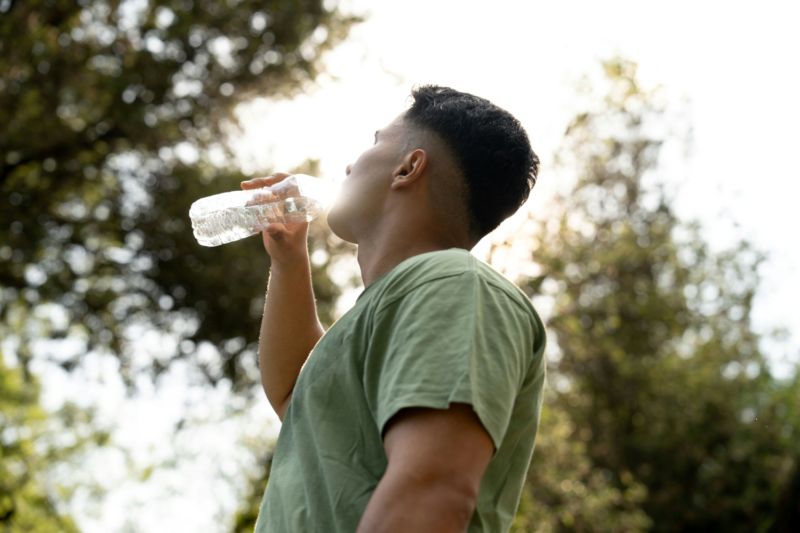As the mercury in thermometers across the East Coast soars to record-breaking heights, the threat of extreme heat becomes a stark reality. Unprecedented temperatures are not just an inconvenience; they pose a severe risk to health and life. We offer our best tips to stay safe–and cool–in hot situations, omitting the most obvious, like staying in an air-conditioned room.
The Body On Heat
The human body has an uncanny ability to cope with extremes, although, like anything, it has limits. When the body begins to heat (especially for those who aren’t used to it), several mechanisms are initiated to cool down and maintain a stable internal temperature, known as thermoregulation.
As anyone suffering from temperatures nearing 100 degrees Fahrenheit will know, sweating is one way the body can cool itself. Sweating evaporates from the skin’s surface, helps dissipate heat and cools the body.
Blood vessels in the skin also dilate, a process known as vasodilation, to increase blood flow to the skin’s surface, promoting heat loss. The trouble is that prolonged exposure to high temperatures can overwhelm these cooling mechanisms, leading to heat-related illnesses like heat exhaustion or heat stroke. Symptoms vary but can include heavy sweating, rapid pulse, dizziness, fatigue, nausea, and headache. In severe cases, it can lead to confusion, unconsciousness, and even death.
Now more than ever, the importance of the healthcare sector is making the front lines. Let us not forget that specialists, first responders, junior doctors, and nurses make such a huge difference in times like these. Nor should we forget those still training in courses like an accelerated program in nursing: studying hard so they can get to work as soon as possible to help others.
To help you get by amid increasing temperatures and relieve some of the pressure on these invaluable healthcare workers, we have put together a list of the best ways to cool down and enhance the body’s thermoregulatory process.

1. Fluids
The process above of regulating temperature relies heavily on consuming enough fluids. As sweat evaporates from the skin, you lose heat and bodily fluids, including electrolytes like sodium and potassium. If these losses are not adequately replaced, it can result in dehydration. Dehydration can impair the body’s ability to regulate heat and can increase the body’s core temperature. Symptoms can range from mild, such as thirst and fatigue, to severe, such as dizziness, confusion, and even heatstroke.
In a heatwave, it’s crucial to replenish the body with fluids and electrolytes lost through sweat. Drinking water is essential, but it’s often insufficient as it doesn’t replace lost electrolytes. Consuming sports drinks or other sources of electrolytes can be very beneficial. Unfortunately, many electrolytes contain a lot of sugar, so if possible, seek a low-sugar option like Liquid I.V..
Foods high in water content, such as fruits and vegetables, can also contribute to hydration. At the end of the day, what matters most is drinking before you feel thirsty, as thirst is not always an early indicator of the body’s need for water. Staying well-hydrated and replenishing electrolytes is key to staying safe and healthy in a heatwave.
2. Taking Things Slow
For those who have to work outdoors, regardless of the well-meant advice to “stay indoors” is of little help. Instead, the Red Cross recommends slowing things down a touch. Working around peak temperatures means you will still get work done but lower the risk of heatstroke.
In places like Australia’s Northern Queensland, where summer temperatures regularly reach the high 80s, specific regulations are designed to keep workers safe while getting the job done. Workers start early, wear loose-fitting cotton clothes and wide hats, have access to shade, targets are relaxed, breaks are mandated, and work stops if the temperature and humidity rise too far. All these steps can be applied to anyone working where air con is not to make the workday both manageable and safe.
3. Cold Showers
While it may not sound fun to everybody, the World Health Organization (WHO) recommends taking cold showers to keep the body cool and hydrated. You could also try cold wraps, towels, or sponges.
One of the quickest ways to cool down for anyone who doesn’t have access to or fancy a cold shower is to put the hands and feet in a bucket/cold wrap. The body’s extremities have a large number of blood vessels close to the surface, which can help cool you down quickly.
4. Avoiding Diuretics
A diuretic is essentially any chemical that increases the production of urine. Many medicines cause this on purpose, mainly to treat high blood pressure. There are also several diuretics that people consume on a very regular basis: alcohol and coffee. As anyone who has had a big night out well knows, alcohol makes you pee. This is because Drinking alcohol inhibits the body’s release of the hormone vasopressin, more commonly known as anti-diuretic hormone (ADH).
When you drink alcohol, it inhibits the release of ADH, which usually helps your body retain water. With reduced ADH, your kidneys produce more urine, leading to dehydration.
Caffeine works on the same ADH mechanism as alcohol; however, the level at which a cup of coffee will increase diuresis is far lower than that of alcohol, and studies have found around 5 cups of coffee would be needed for the average person to start feeling dehydrated.
5. Spicy Foods
Have you ever noticed that the hottest countries have the hottest food? When you eat a hot chili, heat receptors in the body pick up the sensation, so you don’t taste spicy food so much as feel it. While the initial reaction is pure heat, your internal temperature will decrease once the body starts to sweat.
6. Looking Out For Others
In times like this, it matters more than ever to check in on your friends and neighbors because extreme heat is not just a discomfort but a severe danger. As global temperatures continue to rise, this heat wave could be the first of many. Knowing what to do and how to react can keep you safe, so stay hydrated, take things slow, try a cold shower, and avoid diuretics like alcohol and coffee as best you can.
Remember, staying safe in a heatwave is a community effort. Stay cool, stay hydrated, and stay safe.
Disclaimer: This content is for informational purposes only and is not intended as medical advice, nor does it replace professional medical expertise or treatment. If you have any concerns or questions about your health, always consult with a physician or other healthcare professional.
Published by: Khy Talara






